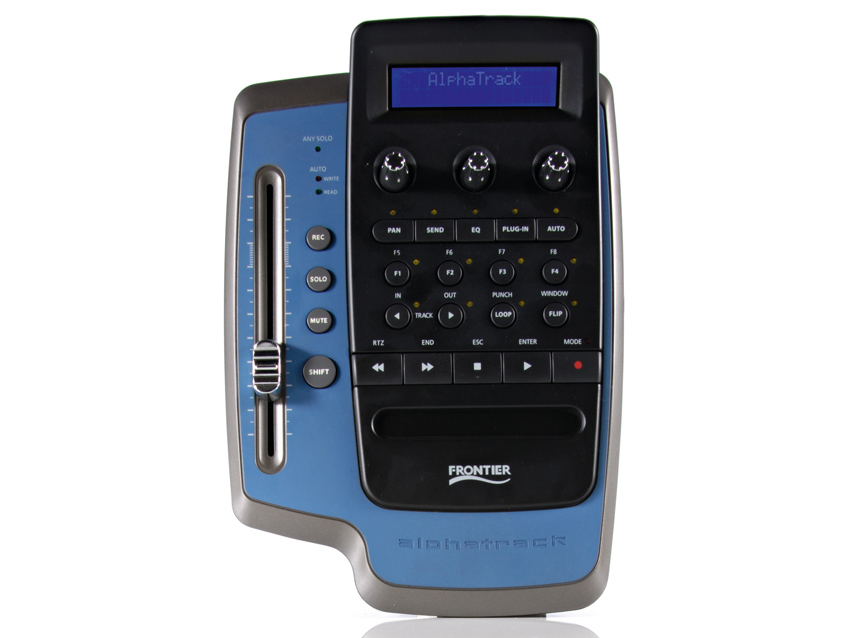MusicRadar Verdict
If you want a slimline DAW controller that won't break the bank (or your desk), this is a great solution.
Pros
- +
Compact. Quick to work with. Good fader. Cool touch strip. Easy to get up and running.
Cons
- -
Slightly noisy transport buttons.
MusicRadar's got your back
The AlphaTrack includes one motorised fader, transport controls, three multipurpose knobs and a rather mysterious touch strip.
The front panel has three main areas. To the left, the 100mm motorised fader is accompanied by Mute, Solo and Record buttons (plus some automation status LEDs).
At the top you´ve got three touch-sensitive rotary encoders with LED screen and function selectors (Pan, Send, EQ, Plug-In and Automation), while at the bottom are the transport controls and a bunch of function and navigation keys.
The innovative ‘touch strip´ sits below the main transport keys. This operates slightly differently from application to application, but the basic gist is that you can jog and shuttle using one finger or two.
In Cubase, this means one finger will scroll the timeline in either direction. Use two, and the speed it scrolls at will depend on how far you move your fingers to the left or right. Tap either end of the strip to hop from marker to marker, and, finally, combine with the Shift key for audible scrubbing.
We found operation to be pretty similar in Pro Tools; the cursor movement follows the nudge resolution set on the navigation strip. However, the real-time scrubbing does seem to be a little unpredictable. Despite this, the touch strip is certainly a very welcome inclusion.
We should also mention the footswitch socket on the back panel, which enables you to punch in ‘hands free´.
Want all the hottest music and gear news, reviews, deals, features and more, direct to your inbox? Sign up here.
It all sounds good on paper, but plenty of hardware controllers have struggled in the past because of lacklustre support from software manufacturers. Unlike plug-ins, there´s no real standard for implementation, so until the software support is added, buyers are often left disappointed.
With the AlphaTrack, Frontier has wisely followed a few established protocols. The result is a box that´ll do the business in Pro Tools, Sonar, Digital Performer, Reason, Live, Logic and Cubase.
In use
Performance is exceptionally good. The fader is quiet and very smooth, and the rotary encoders pick up well. The transport controls are solid and responsive, if a little ‘clicky´.
It took a good look at the manual to nail a few obvious functions in Pro Tools - opening a plug-in requires you to press the Stop and Plug-in buttons together - but it´s surprising just how many functions Frontier has crammed into such a small space.
The onboard LED screen can seem a bit small, but once you get used to the controls, it really only acts as a second line of defence. It becomes very easy to ‘feel´ your way around using the rotary encoders and navigation buttons.
The AlphaTrack is tough to knock - it´s simple, affordable and uncluttered enough to sit on your knee while you lean back and mix in comfort. On the downside, although the unit is great for level controls, transport and parameter changes, it doesn´t extend into the realms of part editing.
Even so, the AlphaTrack remains a very desirable device indeed.
MusicRadar is the number one website for music-makers of all kinds, be they guitarists, drummers, keyboard players, DJs or producers...
- GEAR: We help musicians find the best gear with top-ranking gear round-ups and high-quality, authoritative reviews by a wide team of highly experienced experts.
- TIPS: We also provide tuition, from bite-sized tips to advanced work-outs and guidance from recognised musicians and stars.
- STARS: We talk to musicians and stars about their creative processes, and the nuts and bolts of their gear and technique. We give fans an insight into the craft of music-making that no other music website can.

